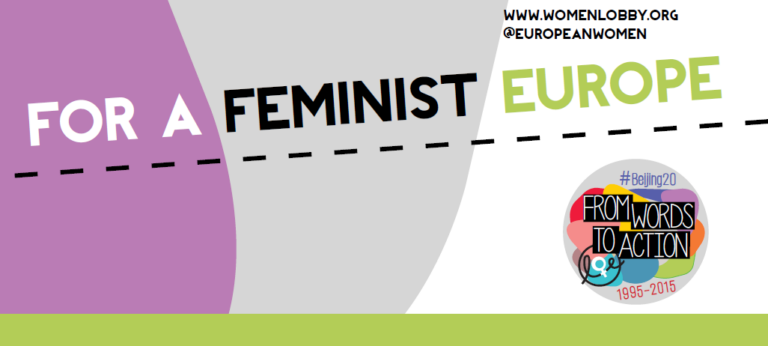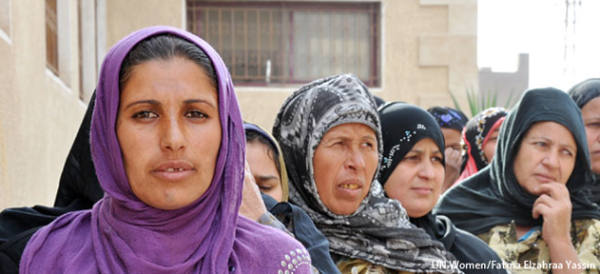[Brussels, 28 October 2011] The announcement by Libya’s interim leader that the new regime would base legislation on Islamic sharia law is raising strong concerns for women’s rights under any new order to govern the country following the deposition of Muammar Gaddafi. Piotential backsliding on women’s basic rights in cases of marriage and divorce is particularly worrisome. Read the Agence France-Press article below by Simon Martelli.
Agence France-Presse, October 24, 2011
By Simon Martelli
TRIPOLI — The announcement that Islamic sharia law will be the basis of legislation in newly liberated Libya has raised concerns, especially among women, despite Islamists insisting moderation will prevail.
Interim leader Mustafa Abdel Jalil said on Sunday, during his speech to the nation in Benghazi to formally declare the country’s liberation from the ousted regime of Muammar Gaddafi, that sharia would be Libya’s principal law.
“Any law that violates sharia is null and void legally,” he said, citing as an example the law on marriage passed during the slain dictator’s 42-year tenure that imposed restrictions on polygamy, which is permitted in Islam.
“The law of divorce and marriage… This law is contrary to sharia and it is stopped,” Abdel Jalil said.
His comments have provoked criticism and calls for restraint both in Libya and in Europe, amid fears that the Arab Spring may give rise to a potentially intolerant Islamist resurgence.
Many Libyans awaiting Sunday’s historic speech expressed surprise at the decision by the National Transitional Council leader to mention the role of sharia law in the new country before addressing such important issues as security and education.
“It’s shocking and insulting to state, after thousands of Libyans have paid for freedom with their lives, that the priority of the new leadership is to allow men to marry in secret,” said Rim, 40, a Libyan feminist who requested anonymity.
“We did not slay Goliath so that we now live under the Inquisition,” she told AFP.
In his speech, Abdel Jalil also announced the introduction of Islamic banking in Libya in keeping with sharia which prohibits the earning of interest, or riba in Arabic, that is considered a form of usury.
Adelrahman al-Shatr, one of the founders of the centre-right Party of National Solidarity, launched just last week, said it was premature for the NTC leader to speak about the policies of the new state.
“It is a subject that should be discussed with the different political groups and with the Libyan people,” he said.
Leader of Libya’s National Transitional Council Mustafa Abdel Jalil shakes hands with an officer during the announcement of the liberation of Libya in Quiche, Benghazi Sunday October 23, 2011.
“These declarations create feelings of pain and bitterness among women who sacrificed so many martyrs,” in the eight-month battle against Kadhafi loyalists, he added.
“By abolishing the marriage law, women lose the right to keep the family home if they divorce. It is a disaster for Libyan women.”
Western leaders also responded swiftly to Abdel Jalil’s comments, with EU foreign policy chief Catherine Ashton saying on Monday Libya’s introduction of sharia law must respect human rights and democratic principles.
Abdel Jalil, a respected former justice minister of Gaddafi who distanced himself from the old regime, is seen as a pious man and a Sufi follower of Islam who is at odds with extremism.
He has already said that the new Libya would not adopt any extremist ideology, and sought to reassure the international community by stating on Monday that Libyans were moderate Muslims.
Nevertheless, Libya’s Islamists are a rising force in the country’s political arena, some of whom, such as Abdelhakim Belhaj, the founder of the Al-Qaeda linked but now-disbanded Libyan Islamic Fighting Group (LIFG), are expected to hold prominent positions.
After suffering decades of persecution by Gaddafi, they are also working hard to present themselves as proponents of tolerant, democratic values and policies.
“The rules and laws (in new Libya) should take Islam as a basic reference,” Islamist leader Sheikh Ali Sallabi, a supporter of Belhaj, said.
He insisted that freedom, justice, equality and respect for human dignity should be enshrined in the new constitution, along with the peaceful rotation of power.
“We believe in the rights of others to show their programmes to the people, and to let the people decide,” said Sallabi, who was jailed for eight years during the 1980s in Tripoli’s notorious Abu Salim prison.
“We also believe in the freedom of the press and the right to self expression. We believe that our religion accommodates these rights,” he added.





